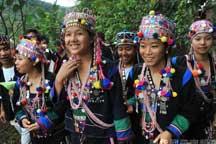[China on the move] From Yunnan: The Staircase to a better life
2009-09-08 13:26 BJTSpecial Report: 60th Anniversary of PRC |
Watch Video

 Play Video
Play Video
Now time for our special series "China on the Move". Most of China's ethnic minority groups live in the western part of the country. Accelerating the development of their economy is a task China faces on its road to establishing a harmonious society. As our reporter Zhang Lu finds out in Yunnan Province, for minority groups like the Hani people, economic development is closely related to the protection of their culture.
The Hani people live in remote mountain areas in southwest Yunnan province.
To make a living, generations of Hani people have worked hard to change the rugged and mountainous terrain into arable land. They've built thousands of hectares of terraces, from the foot of the mountains to the very tip.
The huge-scale terraces are now one of the world's most famous agricultural wonders.
With a history of more than 13-hundred years, the Hani Terraces are still functioning well today. But now, these magnificent achievements are no longer able to guarantee a better life for their creators.
Fifty-five-year-old Li Xiaosheng and his family have lived in a traditional-style Hani-house for decades. Li's mother is nearly 100 years old.
Life hasn't changed much for them in years.
Li said, "The house is more than 70 years old. We want to build a new one, but we don't have enough money.
The total annual income for the entire family is now (please use Chinese yuan) or about 12-hundred US dollars. But the main source of money is not from the terraced crops.
Li said, "Around 2002, the village began to develop tourism. We have had more income since then and life has improved a lot."

 Mail
Mail Share
Share Print
Print


 Video
Video









 2009 China Central Television. All Rights Reserved
2009 China Central Television. All Rights Reserved